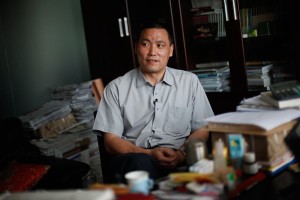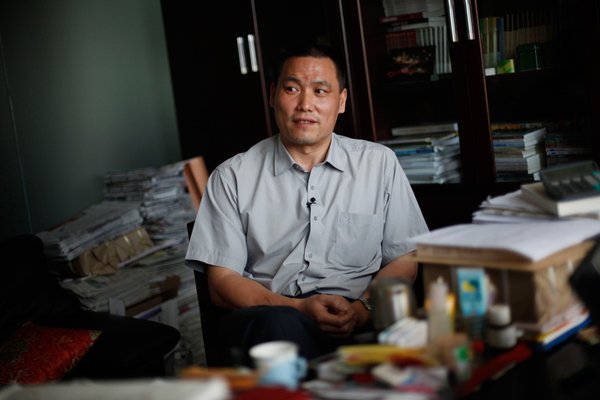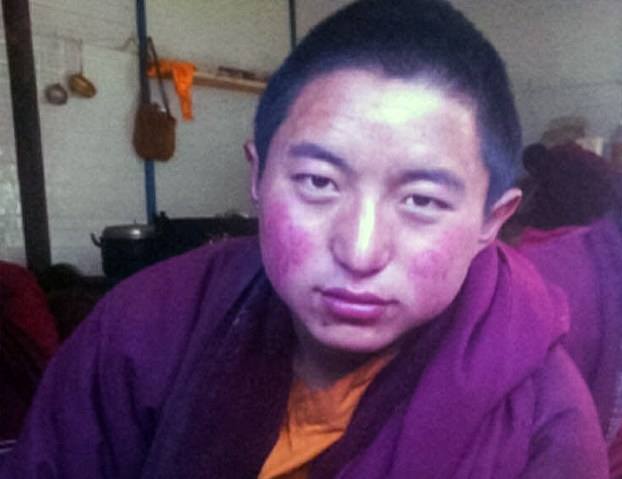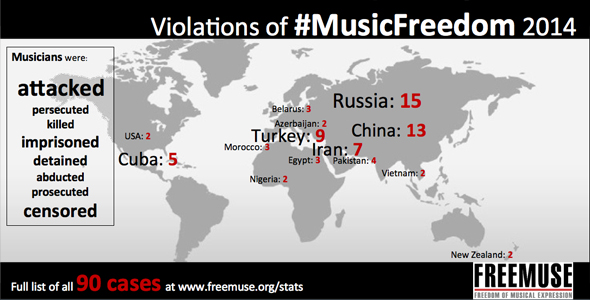China: Inventing a Crime
Perry Link, The New York Review of Books|February 9, 2015
In late January, Chinese authorities announced that they are considering formal charges against Pu Zhiqiang, one of China’s most prominent human rights lawyers, who has been in detention since last May. Pu’s friends fear that even a life sentence is possible. The crime? “Picking fights and causing trouble,” and other related offenses, on his microblog. Even amid a growing wave of repression under the leadership of Xi Jinping, the outlandish nature of these pending charges stands out. Pu’s short, Twitter-like posts to his Weibo account are unusual for their cleverness, but do not really stand out by the standards of the Chinese Internet. After the authorities’ list of allegedly criminal posts was leaked, comments like this appeared: “What’s so new? We’ve been talking like this for years” and “If these are crimes, can the prisons hold a few million more?”
If the case results in a criminal conviction and a lengthy prison term, the effects on China’s Internet will be devastating. The casual sarcasm that has been the coin of its realm will suddenly become perilous, and self-censorship will become even more pervasive than it already is. Such an outcome, though, would be quite in line with the general chill on dissent that Xi Jinping has brought to China during the last two years. It also makes sense that the regime would choose Pu Zhiqiang as its example to show everyone, emphatically, what not to do on the Internet, because the fifty-year-old lawyer is one of China’s most celebrated crusaders for legal rights. If he can be silenced, no one is safe.

Tall, handsome, with a sonorous voice, Pu Zhiqiang would have been a natural politician in a different political system. Taking on the hardest cases, he has defended dissident writers and the artist Ai Weiwei, but also simple ordinary folk who have exposed corrupt officials and government oppression. He has represented Tibetans, Uighurs, and even other rights lawyers. And he’s been unafraid to confront “big tigers” like former national security chief Zhou Yongkang, whom Pu denounced in 2013 as a “traitor to the Chinese people.”
Pu’s renown has grown all the more for his unusual way with words. Whether in court or online, he is adept at mixing classical erudition and street vernacular. Twitter was made for him, but Twitter is banned in China. He used Weibo, China’s domestic platform for microblogging, where his posts attracted tens of thousands of followers, to the irritation of Chinese authorities. (Whenever his following got too large, his Weibo account would be cancelled; he would then open a new account, building followers until the same thing happened again.)
Still, until last spring, Pu had managed to stay out of jail. There are two reasons for this. One is that the better known a person is, the larger is the price in public opinion that the regime must pay for persecuting him or her. (Ai Weiwei is perhaps the most prominent such example.) The other reason is that Pu has always stayed within the letter of the law. Officials at several levels have been extremely angry at Pu at one time or another, but they are leery about coming after him with the law he knows so well. And it doesn’t look good to oppose what Pu Zhiqiang stands for.
In early May 2014, however, Pu and at least four others were detained for meeting at the home of his friend Hao Jian, a professor at the Beijing Film Academy, to mark the upcoming twenty-fifth anniversary of the Tiananmen massacre. All were later released, except Pu. As he negotiated with his captors about access to his lawyers, and about whether and how he could take his medications to control blood pressure, cholesterol, and diabetes, government prosecutors began searching for evidence against him. They went to his home and to his law firm, seizing computers, files, and notebooks. They summoned people from across China for closed-door interviews. They seemed to be hunting especially for signs of treason, sexual misconduct, or corruption.
After months of research and interrogation, Chinese prosecutors apparently gave up on sex, money, and treason and settled instead for twenty-eight Weibo posts by Pu that could serve as evidence for four crimes: “picking fights and causing trouble,” “inciting ethnic hatred,” “inciting separatism,” and “leaking personal information.” On January 27, the list of allegedly incriminating posts was leaked to the Internet.
In their language—the word-play and stiletto wit—the posts are vintage Pu. In one, he borrows the ancient warrior Lü Bu (d. 199 CE) to poke fun at Huang Qifan, a recent mayor of Chongqing. Both men were sycophants who presented different faces in every direction and consequently lacked selves of their own. Pu, pretending sympathy for people who would like to express embarrassment but cannot, posts: “With no face of any kind, how can you have a red one?”
The government’s list is not well edited. Without explanation, posts 1 and 13 are nearly identical. In no case is a post specifically tied to any of the four criminal charges that ostensibly are being illustrated; one must guess at the relevance of each, as well as at the context. Post 16, for example, lambastes “a scholar” for “stupidity.” Which scholar? On what issue? Nothing is said about that. It seems fairly clear that personal conflicts, not legal issues, are at stake in several of the posts.
Seven posts are about ethnic problems in Xinjiang or Tibet, and another four concern “separatism” in and around Taiwan. These are not issues that, in general, Pu spends a lot of time writing about; his main concerns are with the Chinese heartland. But they are useful issues for the government to highlight because, by portraying Pu as siding with people who would “split the motherland,” they may help stimulate popular sentiment against the writer and in favor of the authorities, who pose as the guardians of nationalist pride.
In post 25, for example, Pu responds to his super-nationalist critics who call him a traitor. “I’m not the one who chose the Communists to rule the country,” Pu writes, “and they never asked my views on the matter. Where does their demand for my unconditional support come from? If being a traitor could mean releasing our citizens from their torment by handing over a dozen or so provinces and three or five hundred million people to democratic countries, then my deepest regret would be only that I have failed as a traitor.” In post 26 he writes, “If China were handed to Japan to take care of, think how much better people’s lives would be! Get it?!”
We don’t know who Pu was arguing with here and what prompted this specific retort. Out of context, though, words like “hand China to Japan” are red meat for the regime’s propaganda workers. Chinese public resentment of Japan’s World War II invasion is strong, and these words of Pu’s can be tools used to paint him as a traitor. His view of the Japanese invasion eighty years ago—as shown in another post—is that it was a “catastrophe” and “anathema to god and man.” But the regime will keep that away from the Chinese public.
In his comments on Uighurs and Tibetans, Pu tries to appreciate how ethnic minorities see things—not ideologically but as practical matters of daily life. He hears about a new regulation ordering that Buddhist temples in Tibet hang portraits of the top Chinese leaders—all Han—and that the stated reason for the move is “to dissipate religious consciousness.” He posts: “Are Han heads insane? Or only the head Hans?” When militant Uighurs massacre people at the Kunming railway station, Pu denounces the violence but then posts, “This is a result, not just a cause.”
The posts that the regime seems to be counting as “picking fights and causing trouble” usually show disrespect for the Communist Party’s fakery. They are sometimes blunt (“This Party, top to bottom, could not survive without lies”) and sometimes wickedly witty. On Shen Jilan, a representative of record-setting longevity in the People’s Political Conference, who boasted of casting not one single “nay” vote in sixty years, Pu wonders: “Good at feigning stupidity? Or is this authentic stupidity?”
It may seem odd to detain someone first and then go look for the reasons for the detention, but in fact this is a well-established pattern. In the trial of the Maoist “Gang of Four” after Mao Zedong died, in Deng Xiaoping’s charges against the dissident astrophysicist Fang Lizhi in 1989, in the prosecution of Nobel Peace laureate Liu Xiaobo in 2009, and in many other cases, the questions “What law was broken?” and “What facts show that it was broken?” have both been researched after detentions are ordered. And in Pu’s case, by going after Internet speech, however harmless or trivial it may be, the authorities may be staking out a further area in which the regime of Xi Jinping hopes to tighten its control.
The case of Pu Zhiqiang is at a crossroads. The prosecution has about forty days in which to decide among three courses of action: 1. Indictment and trial, which could result in a long prison sentence; 2. Return of the case to police for further investigation; or 3. Release. Crucial to the decision will be whether the artificial crimes can be made to seem plausible in the public view.



